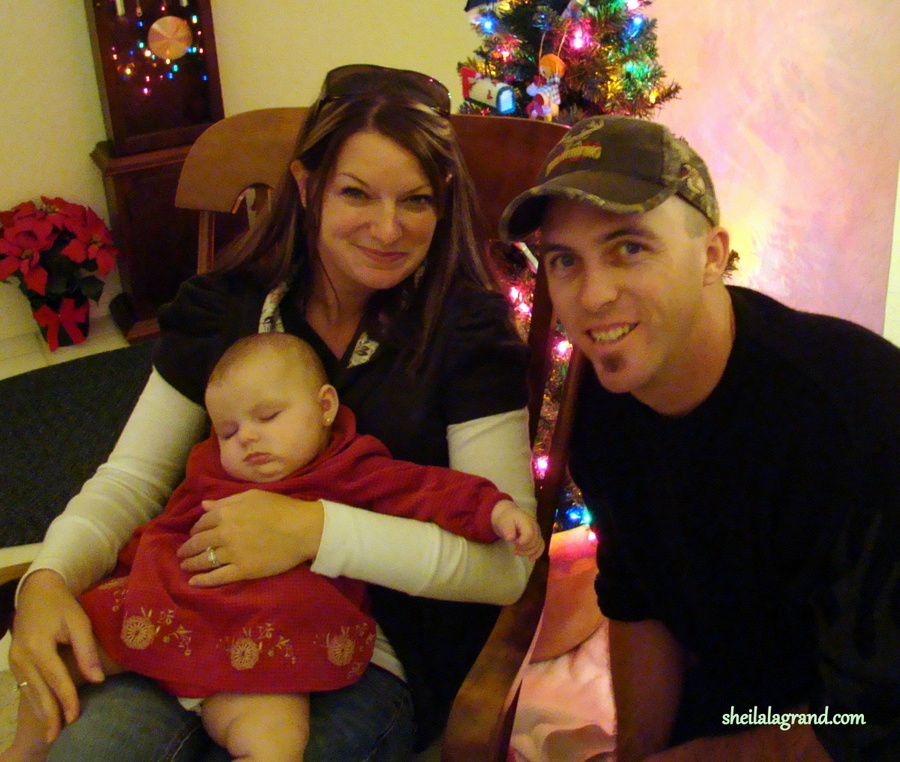 Baby Carly, Rachael, Kevin. Christmas, 2008.
Baby Carly, Rachael, Kevin. Christmas, 2008.
Not talking, actually. Parenting. Who are you parenting to? Or who are you grandparenting to? This question differs from who are you parenting? or who are you grandparenting? I’m thinking audience. Specifically, I am wondering if our acts of parenthood or grandparenthood serve as a report card to our own parents.
Maybe at dinner time, you’re saying, See, Mom? I don’t force my children to eat everything on their plates. We don’t empower a few congealing bites of mashed potatoes and gravy to undermine the pleasant atmosphere at our table. In other words, you’re giving your mom a D in Food Consumption Regulations.
But maybe at dinner time, you’re saying, See, Mom? My kids are finishing their dinners, just like you always made us clean our plates. Another generation is learning not to be wasteful or finicky. You’re awarding your lucky mom an A+ in dinner time rules.
A third option: You repeat patterns you grew up with not as a message to Mom (and Dad) but because you don’t have time to reinvent the wheel, what with soccer practice and flute lessons and karate class and Gaaah! Must book haircuts before school pictures! If Maria is feeding her peas to the dog under the table, who cares? The kids are healthy. And so is the dog.
Friends, please consider these points. If you’re handing out scorecards to your parents as you rear your children, that’s an odd convolution that we call passive-aggressive. (I caught myself, to my dismay, flunking my dad on an arcane point of grandparent-to-parent communications. So yeah, I know.)
An alternative: If you want to put your parents on the honor roll, tell them. Better yet, write them. They’ll treasure your words. Best of all, look at my friend Laura Brown’s delightful book, Everything that Makes You Mom: A Bouquet of Memories. It will prompt you to remember–and write down–things you haven’t thought of in years.
If your parents are no longer living, you can honor their legacy by telling your children or grandchildren about them or simply sharing their best moves with other parents. Stories have the power to change the world–or at least to quench the raging fires of the Battle Over Clean Plates.
But what if your parents weren’t honor roll material? You can’t very well send them to the principal’s office after all these years. Instead, forgive them. Find a way to flush that collection of hurts right out of your heart and down into the sewer, where it belongs. If your wounds are substantial, you may need help to get to forgiveness. Pray. Talk with a trusted friend. Talk with your pastor. Seek counseling. Do whatever it takes to forgive. Because who needs a bunch of rancid crap floating around inside her heart? If you struggle to truly forgive, check out my friend Seth Haines’ book, Coming Clean: A Story of Faith. It’s all about forgiveness and finding your way there.
My own policy: If people make me happy, by sharing a good batch of cookies or finessing a sticky family matter or anything in between, I should heap extravagant praise upon them. If people disappoint me, or hurt me, or anger me, I should complain–to God. And then I must forgive. Sometimes it’s hard, really hard, to forgive. But it sure beats having a heart clogged with fermenting pooh.
12 So, as those who have been chosen of God, holy and beloved, put on a heart of compassion, kindness, humility, gentleness and patience; 13 bearing with one another, and forgiving each other, whoever has a complaint against anyone; just as the Lord forgave you, so also should you.14 Beyond all these things put on love, which is the perfect bond of unity.
Colossians 3:12-15 (NASB)
Please join us.





Leave a Comment